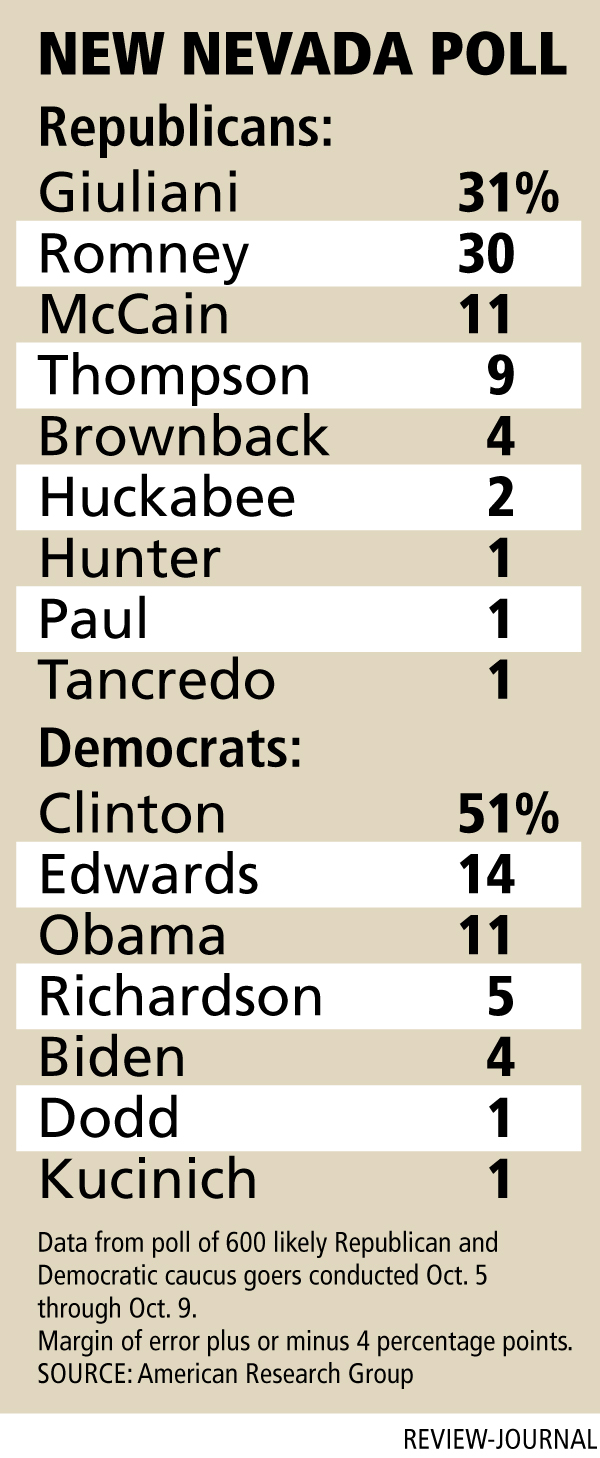Romney’s support growing
Even as other Republican presidential candidates' support in Nevada fluctuates, Mitt Romney's continues to grow, putting him tied for the lead with national front-runner Rudy Giuliani in a new independent poll of likely caucus goers.
Meanwhile, far from being dented by other Democratic candidates' attempts to make inroads, Hillary Clinton's lead has soared to more than 50 percent in the poll conducted over the weekend by American Research Group.
The New York senator and former first lady's 51 percent was 37 points ahead of the second-place candidate, former North Carolina Sen. John Edwards, who had 14 percent, while Illinois Sen. Barack Obama had 11 percent.
The poll of 600 voters on each side who said they planned to participate in party caucuses in January carries a margin of error of plus or minus 4 percentage points.
Romney, the former Massachusetts governor, had 30 percent to former New York Mayor Giuliani's 31 percent in the poll. Arizona Sen. John McCain and former Tennessee Sen. Fred Thompson shared a lower rung with 11 percent and 9 percent, respectively.
In Nevada polls by various organizations over the last several months, the Republican candidates' support has varied widely, reflecting the uncertainty of base voters about a varied field of candidates in an election cycle marked by conservative disillusionment.
Giuliani, for example, went from 37 percent in an April Zogby poll to 12 percent in a May Review-Journal poll to 18 percent in an August poll by the Reno Gazette-Journal. Thompson was the leading candidate with 25 percent in a June survey, before he announced his candidacy. McCain has gone from the high teens to the high single digits over time.
While these candidates' numbers have been all over the map or have declined, Romney's support in Nevada has been on a steady trend upward.
Early this year, when few voters knew who he was, polls put him in single digits in Nevada. In April and May surveys, he jumped to 15 percent; in June his support was measured at 20 percent; and the August poll put Romney at 28 percent in Nevada, leading the pack by a 10-point margin.
Romney is the only Republican to put significant organizational effort in Nevada, with a few staffers and consultants employed in the state, a concerted volunteer effort and plans to open campaign offices. He has campaigned in Elko, Las Vegas, Reno and Carson City and is scheduled to return to Reno on Friday.
Although Nevada will be among the first states to hold a Republican presidential nominating contest in January, a contest that could give its winner significant momentum going forward, the other candidates have largely ignored the state.
"Giuliani has name recognition, and he plays well here because social issues aren't a liability in the divorce capital of the world," said University of Nevada, Las Vegas, political scientist David Damore.
"But Romney has campaigned the hardest of any of these guys. He has an opening, because no one else is here. He's not good nationally, but he's doing well in the key states."
Damore said it's not surprising to see McCain and Thompson in the cellar, because their campaigns have sputtered nationally and they have made no special effort in Nevada.
Kansas Sen. Sam Brownback had 4 percent of Republican caucus goers, former Arkansas Gov. Mike Huckabee 2 percent, and no other candidate more than 1 percent. Ten percent of Republican caucus goers said they were undecided.
Romney's Nevada campaign may be effective, but it pales in comparison to the Democratic candidates', who have employed dozens of organizers, opened multiple offices and repeatedly visited Nevada.
For all their efforts, however, Clinton just seems to get stronger here. No Nevada poll has ever found her to have less than 30 percent of the Democratic vote or less than a double-digit lead over her nearest competitor.
New Mexico Gov. Bill Richardson, who has spent more time in Nevada than any other candidate, was at 5 percent in the poll, while Delaware Sen. Joe Biden had 4 percent. No other candidate exceeded 1 percent, while 13 percent of Democratic caucus goers said they were undecided.
"I can't believe Hillary's over 50 (percent). That's impressive. She's really opened it up," Damore said.
The other Democratic candidates may give up on Nevada as they fail to make inroads, making the state's first-time early contest less significant, he said.
"This is bad news for the caucus," Damore said. "It means it's not competitive, and nobody has any reason to put resources into it."
Democrats lately are spending a lot of time in Iowa, which not only has the first contest but has a much tighter race according to polls.

















